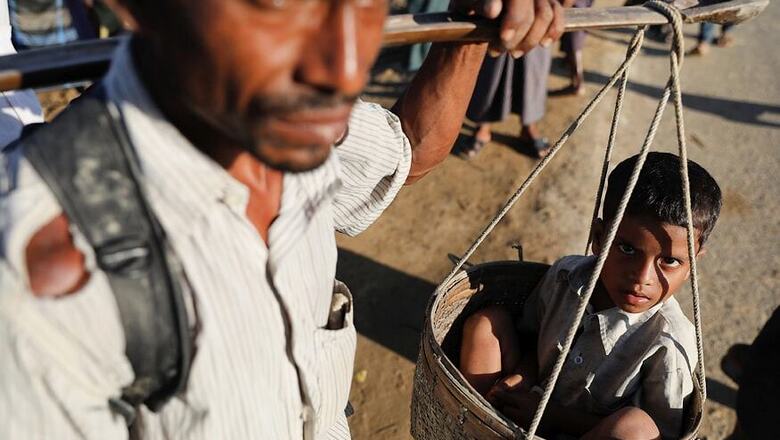
views
Yangon: Myanmar authorities said there was no sign of attacks by Rohingya Muslim militants on Tuesday as a one-month insurgent ceasefire came to end.
The Arakan Rohingya Salvation Army (ARSA) announced the ceasefire from September 10 in order, they said, to facilitate aid deliveries to Rakhine State, where their attacks on the security forces on Aug. 25 triggered a ferocious government crackdown.
The government offensive in the north of Rakhine State has sent some 520,000 Rohingya civilians fleeing to Bangladesh and has drawn international condemnation and UN accusations of ethnic cleansing.
The government denies ethnic cleansing. It had rebuffed the insurgents' ceasefire, saying it did not negotiate with terrorists.
Myanmar says more than 500 people have been killed in the violence since late August, most of them insurgents.
Even before the government offensive, the small, lightly armed ARSA had only appeared capable of hit-and-run raids on security posts and unable to mount any sort of sustained challenge to the army.
Authorities had been on guard over recent days and tightened security in the state capital of Sittwe as the end of the ceasefire approached, a state government spokesman said.
"We had information that the ARSA could attack but there have been no reports," the spokesman, Min Aung, said early on Tuesday.
The insurgents said on Saturday they were ready to respond to any peace move by the government, even though the ceasefire was ending at midnight on Monday.
They also reiterated their demand for rights for the Rohingya, who have never been regarded as an indigenous minority in Myanmar and so have been denied citizenship under a law that links nationality to ethnicity.
Instead, Rohingya are seen as illegal immigrants with freedoms restricted and rights denied, and are derided by ethnic Rakhine Buddhists, and much of the wider popular in Myanmar, which has seen a surge in Buddhist nationalism in recent years.
Thousands more Rohingya villagers have arrived in Bangladesh this week in a new surge of refugees, now also driven by fears of starvation and telling of bloody attacks by Buddhist mobs on people trekking towards the border.
'VERY REAL THREAT'
Villagers in Rakhine said food was running out because rice in the fields was not ready for harvest and the state government had closed village markets and restricted the transport of food, apparently to cut supplies to the militants.
"While the Myanmar military has engaged in a campaign of violence, there is mounting evidence that Rohingya women, men and children are now also fleeing the very real threat of starvation," rights group Amnesty International said.
The government has cited worry about food as one of he reasons people have been giving for leaving, but a senior state government official on Monday dismissed any suggestion of starvation.
Myanmar leader and Nobel peace laureate Aung San Suu Kyi has faced scathing international criticism for not doing more to stop the violence, although she has no power over the security forces under a military-drafted constitution.
The United States and European Union have been considering targeted sanctions against Myanmar military leaders, diplomats and officials have told Reuters, although they are wary of action that could destabilise the country's transition to democracy.
EU foreign ministers will discuss Myanmar on Oct. 16, and they said in a draft joint statement the bloc "will suspend invitations to the commander-in-chief of the Myanmar/Burma armed forces and other senior military officers".
Such a move would be largely symbolic, but could be followed by further action.
The military campaign against the insurgents is popular inside Myanmar, formerly known as Burma, where there is little sympathy for the Rohingya.
Suu Kyi's party, in the first attempt to improve relations between religions since the latest violence erupted, will hold inter-faith prayers on Tuesday at a stadium in the biggest city of Yangon, with the participation of Buddhists, Muslims, Hindus and Christians.
"This is for peace and stability," party spokesman Aung Shin told Reuters. "Peace in Rakhine and peace nationwide."
The Rohingya had pinned hopes for change on Suu Kyi's party but it has been wary of upsetting Buddhist nationalists. Her party did not field a single Muslim candidate in the 2015 election that it swept.




















Comments
0 comment